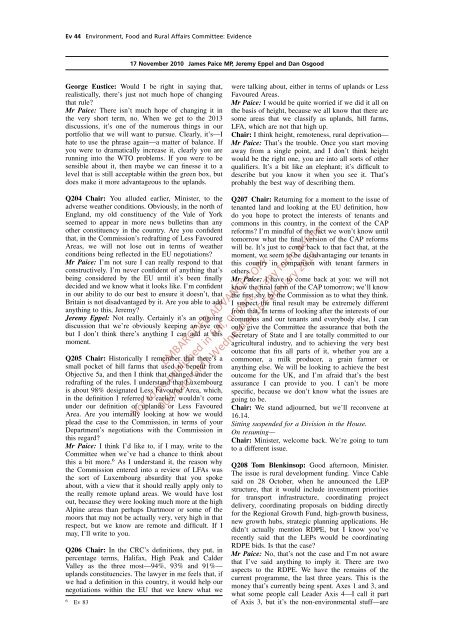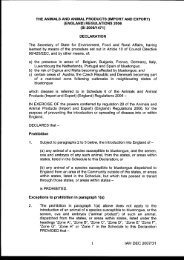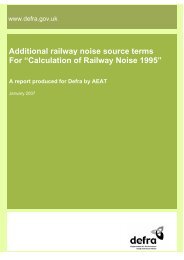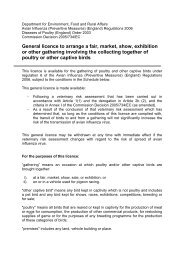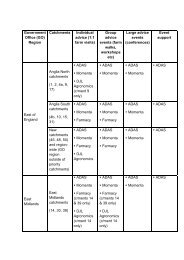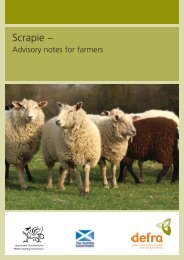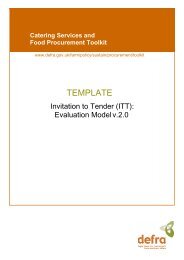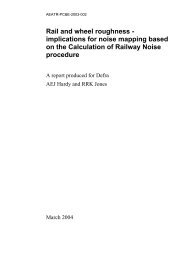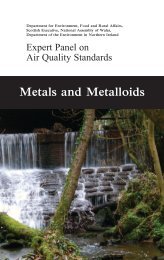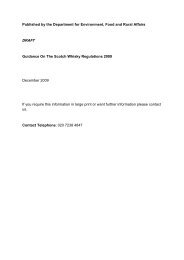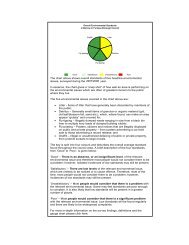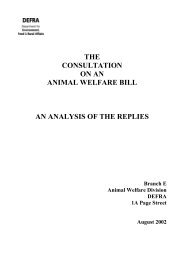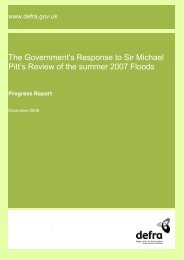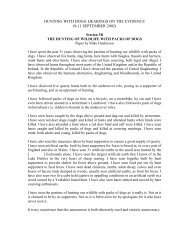Farming in the Uplands - ARCHIVE: Defra
Farming in the Uplands - ARCHIVE: Defra
Farming in the Uplands - ARCHIVE: Defra
You also want an ePaper? Increase the reach of your titles
YUMPU automatically turns print PDFs into web optimized ePapers that Google loves.
Ev 44 Environment, Food and Rural Affairs Committee: Evidence<br />
17 November 2010 James Paice MP, Jeremy Eppel and Dan Osgood<br />
George Eustice: Would I be right <strong>in</strong> say<strong>in</strong>g that,<br />
realistically, <strong>the</strong>re’s just not much hope of chang<strong>in</strong>g<br />
that rule?<br />
Mr Paice: There isn’t much hope of chang<strong>in</strong>g it <strong>in</strong><br />
<strong>the</strong> very short term, no. When we get to <strong>the</strong> 2013<br />
discussions, it’s one of <strong>the</strong> numerous th<strong>in</strong>gs <strong>in</strong> our<br />
portfolio that we will want to pursue. Clearly, it’s—I<br />
hate to use <strong>the</strong> phrase aga<strong>in</strong>—a matter of balance. If<br />
you were to dramatically <strong>in</strong>crease it, clearly you are<br />
runn<strong>in</strong>g <strong>in</strong>to <strong>the</strong> WTO problems. If you were to be<br />
sensible about it, <strong>the</strong>n maybe we can f<strong>in</strong>esse it to a<br />
level that is still acceptable with<strong>in</strong> <strong>the</strong> green box, but<br />
does make it more advantageous to <strong>the</strong> uplands.<br />
Q204 Chair: You alluded earlier, M<strong>in</strong>ister, to <strong>the</strong><br />
adverse wea<strong>the</strong>r conditions. Obviously, <strong>in</strong> <strong>the</strong> north of<br />
England, my old constituency of <strong>the</strong> Vale of York<br />
seemed to appear <strong>in</strong> more news bullet<strong>in</strong>s than any<br />
o<strong>the</strong>r constituency <strong>in</strong> <strong>the</strong> country. Are you confident<br />
that, <strong>in</strong> <strong>the</strong> Commission’s redraft<strong>in</strong>g of Less Favoured<br />
Areas, we will not lose out <strong>in</strong> terms of wea<strong>the</strong>r<br />
conditions be<strong>in</strong>g reflected <strong>in</strong> <strong>the</strong> EU negotiations?<br />
Mr Paice: I’m not sure I can really respond to that<br />
constructively. I’m never confident of anyth<strong>in</strong>g that’s<br />
be<strong>in</strong>g considered by <strong>the</strong> EU until it’s been f<strong>in</strong>ally<br />
decided and we know what it looks like. I’m confident<br />
<strong>in</strong> our ability to do our best to ensure it doesn’t, that<br />
Brita<strong>in</strong> is not disadvantaged by it. Are you able to add<br />
anyth<strong>in</strong>g to this, Jeremy?<br />
Jeremy Eppel: Not really. Certa<strong>in</strong>ly it’s an ongo<strong>in</strong>g<br />
discussion that we’re obviously keep<strong>in</strong>g an eye on,<br />
but I don’t th<strong>in</strong>k <strong>the</strong>re’s anyth<strong>in</strong>g I can add at this<br />
moment.<br />
Q205 Chair: Historically I remember that <strong>the</strong>re’s a<br />
small pocket of hill farms that used to benefit from<br />
Objective 5a, and <strong>the</strong>n I th<strong>in</strong>k that changed under <strong>the</strong><br />
redraft<strong>in</strong>g of <strong>the</strong> rules. I understand that Luxembourg<br />
is about 98% designated Less Favoured Area, which,<br />
<strong>in</strong> <strong>the</strong> def<strong>in</strong>ition I referred to earlier, wouldn’t come<br />
under our def<strong>in</strong>ition of uplands or Less Favoured<br />
Area. Are you <strong>in</strong>ternally look<strong>in</strong>g at how we would<br />
plead <strong>the</strong> case to <strong>the</strong> Commission, <strong>in</strong> terms of your<br />
Department’s negotiations with <strong>the</strong> Commission <strong>in</strong><br />
this regard?<br />
Mr Paice: I th<strong>in</strong>k I’d like to, if I may, write to <strong>the</strong><br />
Committee when we’ve had a chance to th<strong>in</strong>k about<br />
this a bit more. 6 As I understand it, <strong>the</strong> reason why<br />
<strong>the</strong> Commission entered <strong>in</strong>to a review of LFAs was<br />
<strong>the</strong> sort of Luxembourg absurdity that you spoke<br />
about, with a view that it should really apply only to<br />
<strong>the</strong> really remote upland areas. We would have lost<br />
out, because <strong>the</strong>y were look<strong>in</strong>g much more at <strong>the</strong> high<br />
Alp<strong>in</strong>e areas than perhaps Dartmoor or some of <strong>the</strong><br />
moors that may not be actually very, very high <strong>in</strong> that<br />
respect, but we know are remote and difficult. If I<br />
may, I’ll write to you.<br />
Q206 Chair: In <strong>the</strong> CRC’s def<strong>in</strong>itions, <strong>the</strong>y put, <strong>in</strong><br />
percentage terms, Halifax, High Peak and Calder<br />
Valley as <strong>the</strong> three most—94%, 93% and 91%—<br />
uplands constituencies. The lawyer <strong>in</strong> me feels that, if<br />
we had a def<strong>in</strong>ition <strong>in</strong> this country, it would help our<br />
negotiations with<strong>in</strong> <strong>the</strong> EU that we knew what we<br />
6 Ev 83<br />
were talk<strong>in</strong>g about, ei<strong>the</strong>r <strong>in</strong> terms of uplands or Less<br />
Favoured Areas.<br />
Mr Paice: I would be quite worried if we did it all on<br />
<strong>the</strong> basis of height, because we all know that <strong>the</strong>re are<br />
some areas that we classify as uplands, hill farms,<br />
LFA, which are not that high up.<br />
Chair: I th<strong>in</strong>k height, remoteness, rural deprivation—<br />
Mr Paice: That’s <strong>the</strong> trouble. Once you start mov<strong>in</strong>g<br />
away from a s<strong>in</strong>gle po<strong>in</strong>t, and I don’t th<strong>in</strong>k height<br />
would be <strong>the</strong> right one, you are <strong>in</strong>to all sorts of o<strong>the</strong>r<br />
qualifiers. It’s a bit like an elephant; it’s difficult to<br />
describe but you know it when you see it. That’s<br />
probably <strong>the</strong> best way of describ<strong>in</strong>g <strong>the</strong>m.<br />
Q207 Chair: Return<strong>in</strong>g for a moment to <strong>the</strong> issue of<br />
tenanted land and look<strong>in</strong>g at <strong>the</strong> EU def<strong>in</strong>ition, how<br />
do you hope to protect <strong>the</strong> <strong>in</strong>terests of tenants and<br />
commons <strong>in</strong> this country, <strong>in</strong> <strong>the</strong> context of <strong>the</strong> CAP<br />
reforms? I’m m<strong>in</strong>dful of <strong>the</strong> fact we won’t know until<br />
tomorrow what <strong>the</strong> f<strong>in</strong>al version of <strong>the</strong> CAP reforms<br />
will be. It’s just to come back to that fact that, at <strong>the</strong><br />
moment, we seem to be disadvantag<strong>in</strong>g our tenants <strong>in</strong><br />
this country <strong>in</strong> comparison with tenant farmers <strong>in</strong><br />
o<strong>the</strong>rs.<br />
Mr Paice: I have to come back at you: we will not<br />
know <strong>the</strong> f<strong>in</strong>al form of <strong>the</strong> CAP tomorrow; we’ll know<br />
<strong>the</strong> first shy by <strong>the</strong> Commission as to what <strong>the</strong>y th<strong>in</strong>k.<br />
I suspect <strong>the</strong> f<strong>in</strong>al result may be extremely different<br />
from that. In terms of look<strong>in</strong>g after <strong>the</strong> <strong>in</strong>terests of our<br />
commons and our tenants and everybody else, I can<br />
only give <strong>the</strong> Committee <strong>the</strong> assurance that both <strong>the</strong><br />
Secretary of State and I are totally committed to our<br />
agricultural <strong>in</strong>dustry, and to achiev<strong>in</strong>g <strong>the</strong> very best<br />
outcome that fits all parts of it, whe<strong>the</strong>r you are a<br />
commoner, a milk producer, a gra<strong>in</strong> farmer or<br />
anyth<strong>in</strong>g else. We will be look<strong>in</strong>g to achieve <strong>the</strong> best<br />
outcome for <strong>the</strong> UK, and I’m afraid that’s <strong>the</strong> best<br />
assurance I can provide to you. I can’t be more<br />
specific, because we don’t know what <strong>the</strong> issues are<br />
go<strong>in</strong>g to be.<br />
Chair: We stand adjourned, but we’ll reconvene at<br />
16.14.<br />
Sitt<strong>in</strong>g suspended for a Division <strong>in</strong> <strong>the</strong> House.<br />
On resum<strong>in</strong>g—<br />
Chair: M<strong>in</strong>ister, welcome back. We’re go<strong>in</strong>g to turn<br />
to a different issue.<br />
EMBARGOED ADVANCE COPY:<br />
Not to be published <strong>in</strong> full, or part, <strong>in</strong> any form before<br />
00.01am GMT Wednesday 16 February 2011<br />
Q208 Tom Blenk<strong>in</strong>sop: Good afternoon, M<strong>in</strong>ister.<br />
The issue is rural development fund<strong>in</strong>g. V<strong>in</strong>ce Cable<br />
said on 28 October, when he announced <strong>the</strong> LEP<br />
structure, that it would <strong>in</strong>clude <strong>in</strong>vestment priorities<br />
for transport <strong>in</strong>frastructure, coord<strong>in</strong>at<strong>in</strong>g project<br />
delivery, coord<strong>in</strong>at<strong>in</strong>g proposals on bidd<strong>in</strong>g directly<br />
for <strong>the</strong> Regional Growth Fund, high-growth bus<strong>in</strong>ess,<br />
new growth hubs, strategic plann<strong>in</strong>g applications. He<br />
didn’t actually mention RDPE, but I know you’ve<br />
recently said that <strong>the</strong> LEPs would be coord<strong>in</strong>at<strong>in</strong>g<br />
RDPE bids. Is that <strong>the</strong> case?<br />
Mr Paice: No, that’s not <strong>the</strong> case and I’m not aware<br />
that I’ve said anyth<strong>in</strong>g to imply it. There are two<br />
aspects to <strong>the</strong> RDPE. We have <strong>the</strong> rema<strong>in</strong>s of <strong>the</strong><br />
current programme, <strong>the</strong> last three years. This is <strong>the</strong><br />
money that’s currently be<strong>in</strong>g spent. Axes 1 and 3, and<br />
what some people call Leader Axis 4—I call it part<br />
of Axis 3, but it’s <strong>the</strong> non-environmental stuff—are


